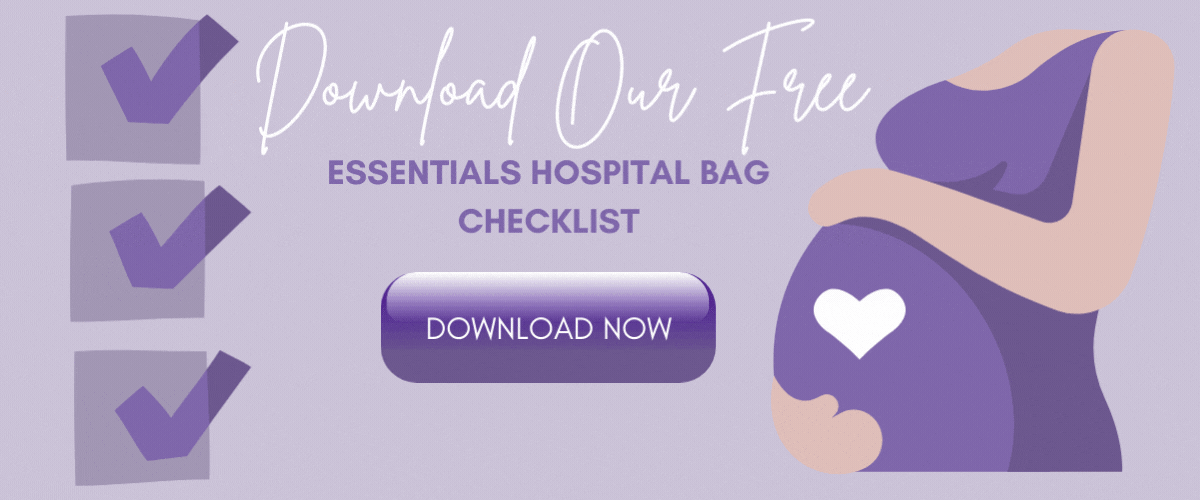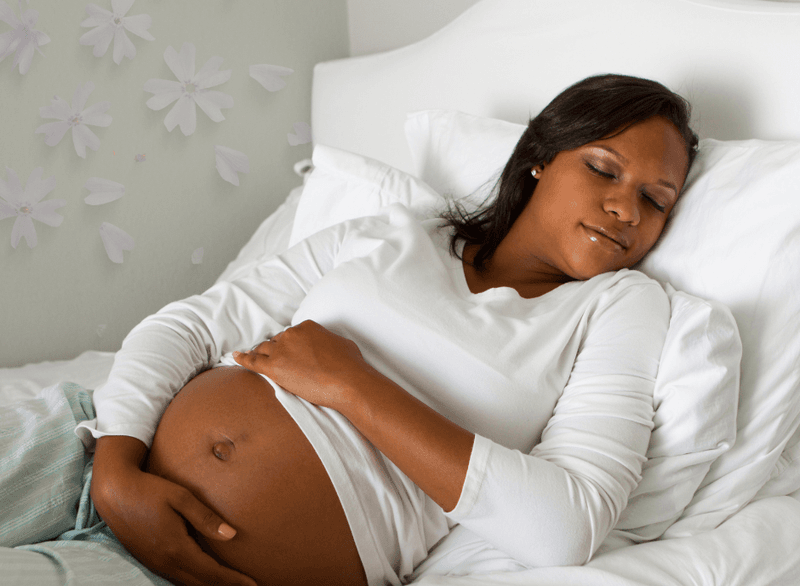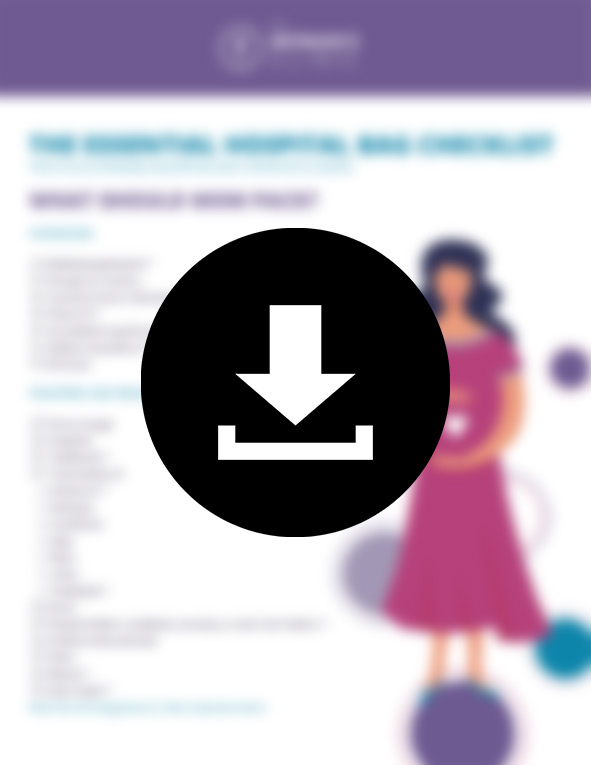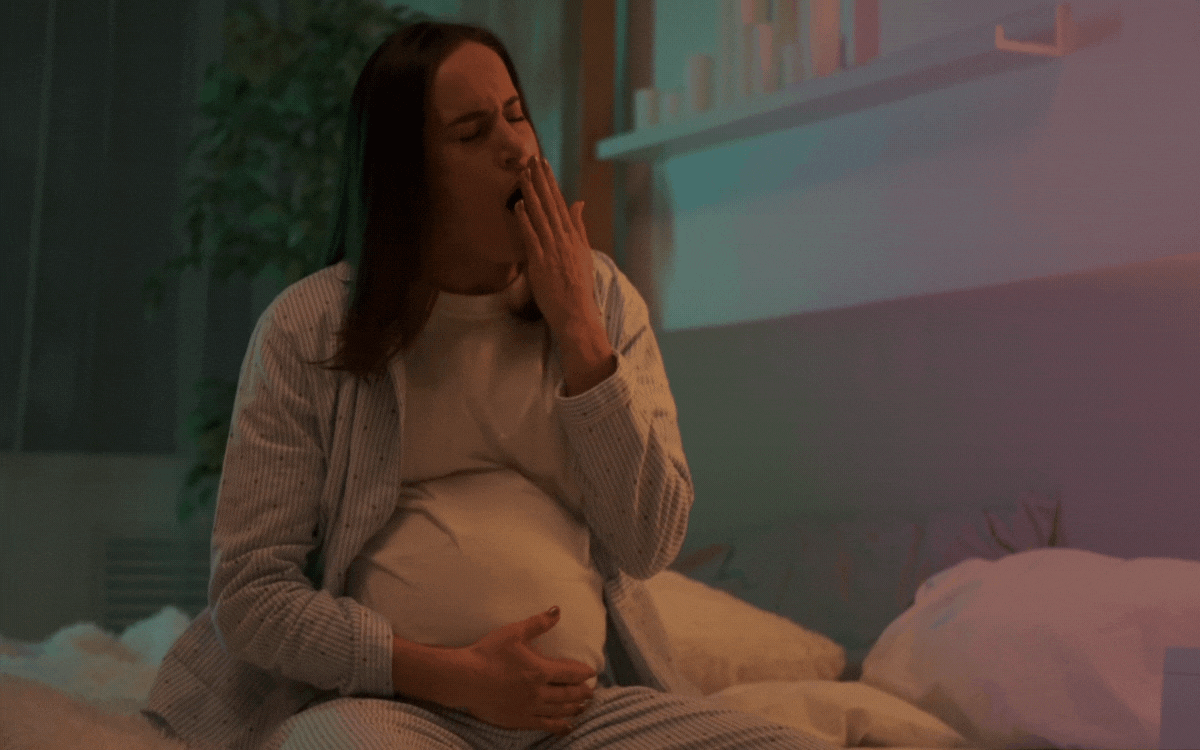The third trimester of pregnancy can be exhausting for many women. Changes in the body, the size of the belly, raging hormones, anxiety, and the anticipation of the upcoming labor and birth can contribute to a decrease in the amount of sleep making fatigue before labor a normality.
But while being tired is entirely normal during pregnancy, there is a certain kind of fatigue that could indicate that labor is near. Read on to learn more about pre-labor fatigue, how to tell it apart from other labor symptoms, and how to deal with common third-trimester fatigue.
Is Sleeping a Lot a Sign of Labor?
The short answer is yes. Extreme fatigue late in the third trimester can be a sign that it is almost time to give birth. This can be the result of a combination of things, including your hormones making sudden shifts or your baby going through a final growth spurt. Many doctors believe that your body feels this extreme fatigue before labor because it is storing up the energy it needs for childbirth.
Think of this as a sign to slow down, take care of yourself, and rest as much as possible. Ask your significant other to take over any heavy lifting so you can enjoy these last few weeks of pregnancy as much as possible. The less stressed and more well-rested you are when you enter labor, the better it will be for you and your baby.

How Can I Tell Pre-Labor Fatigue Apart from Third Trimester Fatigue?
Being pregnant takes a lot of energy, and the third trimester is when your baby is completing its development. By now, you are carrying anywhere from 18 to 40 extra pounds of baby weight—even more, if you are having twins or triplets!
On top of that, your belly is probably making it hard to sleep comfortably; this is especially true for belly and back sleepers. But just being tired does not necessarily mean you are about to go into labor. Try not to panic every time you feel like you need a nap.
For women who experience extreme fatigue before labor, there is a clear difference between this exhaustion and regular sleepiness. If you have had a difficult pregnancy or you are ill around the time of labor, you may find it especially difficult to distinguish between the two.
Many women describe pre-labor fatigue as a slowing down of the body—much like moving through molasses. They sleep hours upon hours in the few days prior to labor. They cannot seem to find the energy to get off the couch or participate in their normal activities.
Again, this should be taken as a sign from your body. Your body is very smart and knows what it needs during pregnancy. And if you are experiencing extreme fatigue, what your body needs is as much rest as possible until you go into labor.
Fatigue on its own is not a sign of labor, but when you combine it with other signs of labor, it can certainly be a signal that birth is approaching. Read on to learn more about some other early signs of labor. If you are experiencing extreme fatigue at the same time as these signs, you may want to begin preparing yourself for labor and childbirth.
Other Early Signs of Labor
The first stage of labor usually lasts between 12 and 24 hours. The contractions will probably feel mild rather than intense during the first few hours. Because of this, it might take some time to realize that your body has actually begun the process of giving birth.
Each woman experiences labor differently. The exact symptoms you experience may be slightly different from those listed here. However, if you notice any of these signs—especially if you are experiencing more than one—it could mean that your body is getting ready to give birth soon.
Pain in the Lower Back
If you are feeling pain in your lower back, you may be experiencing your first contractions. Many women feel pressure in their lower back as the uterus begins to contract during labor. There is no way to know for sure if this pain is caused by contractions, so it is important to talk with your healthcare provider if you notice this symptom.
Check your pain level if you are trying to figure out if this back pain is caused by contractions or if it is just a regular backache. If it stays consistent, it is probably not labor related. However, if your pain level suddenly increases throughout the day, it is possible that you are experiencing a contraction.
Vaginal Discharge
Some women will experience light vaginal discharge as an early sign of labor. This discharge should be thin and clear and should not have an odor. If you notice an increase in the amount of vaginal discharge, or if it becomes thicker and has a foul odor, it could be a sign of infection, and you should contact your doctor or midwife right away.
When you lose your mucus plug, you will experience what is known as a “bloody show,” which is a small speckle of blood in your vaginal discharge. It is easy to miss, but if you do see this happening late in the third trimester, you will likely be going into labor soon.
Frequent Urination
As your body prepares for birth, it will release hormones that will make you urinate more frequently and cause your cervix to soften and open up, making pushing the baby out easier.
If you notice that you are urinating more frequently than normal and your water has not broken yet, you could be in early labor. If you notice this symptom along with other signs of labor, it is important to stay at home and relax. You can drink plenty of water, take a warm bath, or even take a short walk to help ease the symptoms of frequent urination.
Tender Breasts and Nipples
If your breasts have suddenly become tender and painful, it could be an early indicator of labor. This is caused by the hormone oxytocin, which also causes the cervix to dilate and open.
If your nipples become painful, sensitive, and/or swollen, this could be another sign of labor as your body is preparing for breastfeeding.
If you notice both of these symptoms (i.e., tender breasts and nipples), it could mean that you are in early labor, and you should contact your obstetrician or midwife.
Constipation and Loss of Bowel Control
Constipation and/or loss of bowel control is caused by the same hormone that causes your breasts to become tender, as well as other hormones that are released during labor.
If you were not expecting to go into labor soon and you suddenly experience constipation and/or loss of bowel control, it could be a sign of early labor. If this happens, stay at home and relax. You can drink plenty of water, take a warm bath and walk around to help relieve constipation. Do not take any drugs for your constipation or diarrhea without consulting your OBGYN first.

How to Sleep Comfortably Pregnant
Whether you are experiencing extreme fatigue or regular tiredness, sleeping comfortably during pregnancy can become increasingly difficult. Here are some tips to get the best rest possible whether you are experiencing first-trimester, second-trimester, or third-trimester fatigue.
Experiment With Different Pregnancy Sleeping Positions
When you are pregnant, you will find that you need to adjust your body position as you lie down to sleep more than you would during other stages of your life. This is because your growing belly will be putting pressure on your internal organs and make it harder for them to function properly. Sleep can become a difficult task when combined with the extra weight of your growing uterus. Extreme fatigue before labor could be a sign that it’s time to put those packed and prepared hospital bags near the door.
Try to find a position that alleviates any pressure on your organs and puts the least amount of stress on your body. Most experts recommend sleeping on your side. Sleeping on your left side has been found to be optimal for expecting mothers as it helps to reduce the amount of pressure put on the abdomen.
Drink Some Water Before Bedtime
While you may have been advised not to drink water right before bedtime while pregnant, that concern has now been debunked. Do not fret about those nightly glasses of water, as they can actually help you get a better night’s sleep.
When you are dehydrated, your body will produce higher levels of the stress hormone cortisol. In turn, this can lead to lower levels of melatonin, the hormone that regulates sleep. Therefore, it is important to stay hydrated throughout the day and night as it can help you to feel more relaxed and get a better night’s sleep. Try to avoid drinking caffeinated beverages as they can impact melatonin production and disrupt your sleep cycle.
Keep Your Room Dark and Cool
While many pregnant women find that their legs and back hurt when they lie down, others find that their heads feel like they are too big for their pillows. This sensation is likely caused by too much blood flow to the head and too little to the legs.
Try to keep your room as dark and cool as possible. Consider using blackout curtains to reduce light levels. You can also use an eye mask if you are in a room with too many lights that cannot be easily covered. As far as keeping your room cool, try to avoid using a very warm blanket or heavy comforter and run the AC at a temperature that is comfortable for you. Remember, your partner can always put more clothes on if they feel cold.
Invest in a Good Pregnancy Pillow
While some women are able to get comfortable without the help of a pregnancy pillow, others find it to be an absolute necessity. No matter what type of pillow you choose to use, always make sure to clean it regularly, as it can become a breeding ground for bacteria if left unclean.
Some of the most popular pregnancy pillows on the market are the Boppy, the Leachco Snoogle, and the C-shaped pregnancy pillow. There are many other types of pillows that can help to alleviate some of the common sleeping problems during pregnancy such as back pain, leg cramps, and restless sleep.
Pregnancy pillows often come with different shapes and firmness levels to suit a wide range of needs and preferences.
Take a Shower Before Bedtime
This is a trick that many pregnant women swear by. Taking a warm shower before bedtime can help you to unwind, relax, and get ready for sleep. A warm shower can help alleviate some of pregnancy’s challenging night-time discomforts. It may even help to reduce the amount of time it takes you to fall asleep! Your body temperature naturally drops as you fall asleep, sending signals to your brain that it is time to fall asleep. After a hot shower, your body temperature will drop more quickly and release those sweet sleepy chemicals sooner.
Give Yourself a Foot Massage
Massaging your feet has been shown to have several health benefits including reduced stress levels, improved blood flow, and stimulation of the production of hormones that can help to ease the pain.
When your feet are relaxed, you will be able to reach a general state of relaxation more easily and therefore get a better night’s sleep. To massage your feet, sit on the floor with your legs crossed. Place your feet on top of your thighs and use your hands to massage each foot. Alternatively, you can lie down with your feet positioned higher than your head. While this may seem uncomfortable, it is a good position for relieving pressure off your back.
If you have a partner, ask them to massage your feet for you. Relaxing the muscles in your feet affects your calves, thighs, and hips as well. This is especially helpful if leg pain is what is keeping you up at night.
Looking for an Experienced OBGYN?
If you are looking for an experienced and compassionate OBGYN in Little Rock, Arkansas, look no further. Contact the Woman’s Clinic today to schedule your first appointment.
For more information about your third trimester and how to navigate it, check out this helpful checklist from our doctors!


